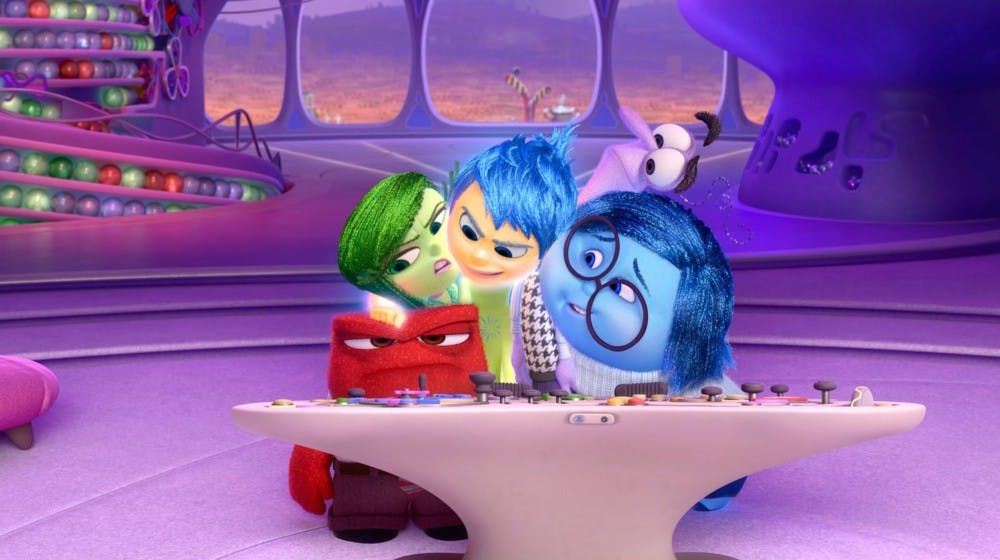Bri Kirkham is a senior telecommunication and journalism news major and writes ‘Miss Brihavin' for The Ball State Daily News. Her views do not necessarily agree with those of The Daily. Write to Bri at bmkirkham@bsu.edu.
Pixar's newest creation "Inside Out" has inspired more think-pieces than the average cartoon normally does. Fans and [very few] critics have been probed to express what they believe the message of this film conveys and, in-turn, what it means to them.
I've seen this movie twice now and am totally enamored by the idea, the characters, the development, everything. It's great. That being said, is it a little emotionally manipulative? Kind of.
Before the movie even starts, Pete Docter, the creator of "Inside Out," appears on the screen thanking the audience for watching his movie. He says that without them, his dream of making people laugh and cry through animation wouldn't be possible. It felt genuine and sincere. And while some could argue that it was a marketing scheme, it was still a nice gesture that the audience seemed to react well to.
One of my favorite things about watching Pixar movies in theaters is the short film beforehand. The premiered short was "Lava" and you can watch a one-minute version here. It's actually a musical animation, you can listen to the full song here. It's beautiful. There was crying. I digress.
 |
|---|
Once the movie begins the audience is introduced to Riley, and soon after, all of her emotions, including: joy, sadness, fear, disgust and anger. Joy, the protagonist, describes the purpose of each emotion. For example: "Anger really cares about things being fair." Which is a really accurate description. "And Sadness... well I'm not really sure why she's here, but I checked and there's nowhere else for her to go." That presumption sets the plot up.
When Riley turns 11, her life is uprooted and sent half-way across the country in a moving van. Her emotions go haywire trying to understand this transition and Joy and Sadness are ejected from headquarters. As the plot progresses it becomes clear how her emotions affect her. Any emotion can give Riley an idea, which she can choose to accept or not. This translates to reality as we can allow our emotions to control us or not.
The majority of the film follows Joy and Sadness as they travel through Riley's mind in an attempt to make it back to headquarters. Without them in control, Riley loses touch with all aspects of her personality. But through this journey, Joy realizes how important Sadness is to Riley's well-being. When Riley is feeling nothing at all, Sadness is the only emotion that can remind Riley how important her family is to her.
Riley's parents often call her their "happy girl," and convince her that putting a smile on her face will make a tough situation easier. Resolution comes when Riley tells her parents that she can't be happy all the time. Her mom and dad express that it's normal, even healthy, to feel sad.
This message is really touching and important, especially for young girls who are constantly reminded to be pleasant and happy, who are told that "the happiest girls are the prettiest." Pretending to be happy, when you're actually sad, doesn't change how you really feel. You can't convince yourself to be happy, and that message doesn't expire. It's important for women, who are often regarded as overly dramatic, to feel comfortable expressing their true emotions. That's just my take on it.
I'm not sure if a message that nuanced could really register with the intended target audience: children. However, adult critics had a lot of feelings about this movie. Some say it was insensitive to make the Sadness character stout with glasses, while Joy was thin and sprite. Others applauded Docter for his creativity and the recreation of an old Disney film: Reason and Emotion.
The varying opinions surrounding "Inside Out" isn't what is necessarily important, though. Anytime a movie, especially an animated one, generates this much [positive or negative] discussion, it should be considered a success. There really is no such thing as bad publicity. But honestly, most of these reviews have been overwhelmingly positive to the point where any negative critiques have been drowned out.
"Inside Out" expresses a timeless and important message: it's okay to not be okay.
Rating: 4.6/5





